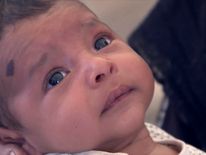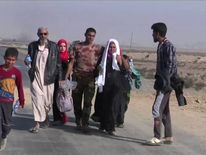Thousands of people living in Mosul could be trapped and used as human shields as Iraqi and Kurdish forces close in on the IS-held city, it has been warned.
Islamic State fighters may resort to holding tens of thousands of civilians against their will, the International Organisation for Migration has warned.
The organisation's chief of mission in Iraq, Thomas Weiss, said they could be used as human shields as the battle to recapture the city intensifies.
He added that he had started storing gas marks due to fears over chemical attacks in the city.
Mr Weiss said: "There has been some evidence that ISIL (Islamic State) might be using chemical weapons.
"Children, the elderly, disabled, will be particularly vulnerable."
The military operation to recapture Mosul could displace between 200,000 and a million people, the UN estimates.
The RAF is providing intelligence gathering and air support to Iraqi ground forces as part of a US-led coalition, while British military commanders have also provided support and training.
Defence Secretary Michael Fallon said IS (also known as Daesh) is "failing" in Iraq, but warned Iraqi forces would not find it easy to drive them out of the city, saying "this will not be a quick operation, and we can expect Daesh to fight hard".
The warning comes as footage has emerged of people fleeing Hud, a small town around 20 miles from Mosul.
Aid groups have warned that a mass exodus of civilians from Mosul and its surrounding areas could overwhelm refugee camps.
The UN Refugee Agency has five camps open with the space to shelter 45,000 people.
It says it could handle 120,000 people if it is able to find sites for several other camps.
During a visit to one of the camps, UN High Commissioner for Refugees Filippo Grandi met a woman who was forced to flee her home with her four-day-old baby.
She said: "I couldn't take all our belongings, we just started moving."
On the humanitarian situation, Mr Grandi said: "The more civilians will feel protected inside Mosul, the less they will be displaced.
"And for those who feel they have to go because it is dangerous, they have to be treated with dignity, with respect in full respect of their rights."
UN humanitarian coordinator for Iraq, Lise Grande, told Sky News that the organisation is "very worried" about the safety of those who choose to leave the city.
She said: "We expect that they're going to be at extreme risk from sniper fire and barrages.
"We know that large parts of the city are probably booby-trapped."



